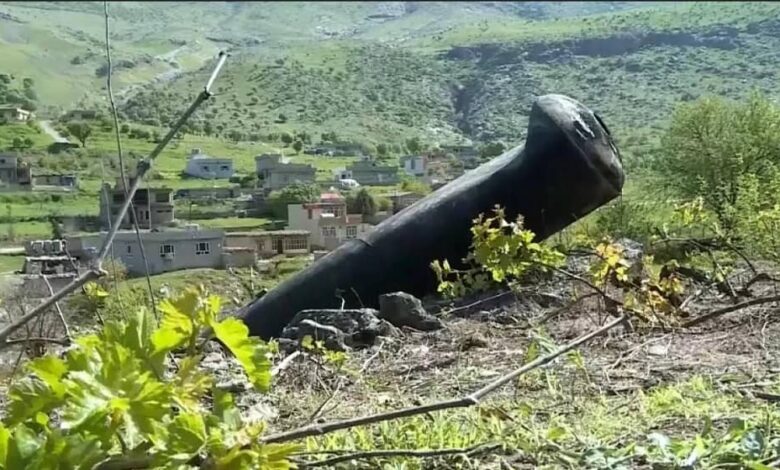Peeling Back the Layers: Iran’s Regime, Terrorism, and the Mirage of Moderation

Iranian missile remnants fired at Israel on April 14 landed in the Iraqi Kurdistan region
Written by
Mehdi Oghbai
Three-minute read
The Iranian regime launched an attack on Israel on Sunday, April 14. Despite its military failure, the incident underscores the threat posed by the world’s largest state sponsor of terrorism. While some advocate for dialogue with the regime to mitigate tensions, the so-called “moderate” faction of the ruling theocracy lauded the attack.
“We must support any action that strengthens the Islamic Republic’s deterrence; this is a national priority,” said Eshaq Jahangiri, the Vice President of Hassan Rouhani, the regime’s former president “Additionally, it’s important to note that deterrence encompasses political, social, and economic dimensions alongside military ones,” he added, according to the state-run Jamaran website on April 15.
“The courageous operation conducted last night by dedicated individuals is a source of pride. This attack was a strategic decision aimed at demonstrating authority, ensuring security, and fostering national pride. We should take pride in our national strength,” said Hassan Khomeini, Ruholla Khomeini’s grandson, according to the Jamaran website on April 15.
“The Zionist regime received a fitting response through the skilled tactics of the armed forces in a strategic and intelligent operation, taking into account all military and security aspects,” Borna News Agency wrote on April 14, quoting Mohammad Reza Aref, a former member of the regime’s parliament from the so-called reformist faction.
NCRI UK Representative @DowlatNowrouzi: "Stop appeasement. Stop in the name of whatever of so-called support of the moderate, to ignore, to ignore the massacre of our youth, to ignore the severe crackdown of our women, to ignore the misogynist policy of a back-forwarded, fanatic… pic.twitter.com/vUbgv60Eb6
— NCRI-FAC (@iran_policy) December 12, 2023
“Israel made a significant mistake by attacking the Iranian consular building in Damascus, resulting in the martyrdom of brave commanders of the IRGC. This action was foolish,” the state-run Arman-e-Melli quoted Hassan Rouhani, the regime’s former president on April 14. “We hope the Zionists have learned their lesson, cease their aggression, and face consequences. If they persist in their aggression, they will face consequences, though we hope they won’t repeat their mistakes,” he added.
When it comes to terrorism, warmongering, and oppression, there is no distinction between the factions of the regime. Their foremost aim is to preserve the regime regardless of the toll. The ruthless suppression of 1,500 protesters during the 2019 nationwide uprising occurred under Rouhani’s presidency. Throughout his tenure, nearly 8,000 individuals were executed.
Rouhani’s Foreign Minister, Javad Zarif, blatantly acknowledged his close relationship with Qassem Soleimani. He praised the commander of the Revolutionary Guards (IRGC) Quds Force as a “hero” following his elimination in 2020.
In 2018, Assadollah Assadi, a diplomat-terrorist stationed in the regime’s embassy in Vienna, orchestrated a thwarted bombing plot against the Iranian Resistance’s annual “Free Iran” rally in Paris.
Assadi personally transported explosives from Iran, exploiting his diplomatic privileges, to his operatives assigned to bombing the venue in Paris.
Furthermore, it is noteworthy that a significant portion of the regime’s terrorist attacks and assassinations occurred during the tenure of its purportedly “moderate” president, Akbar Hashemi Rafsanjani. This period saw notorious incidents such as the brutal killing of Iranian Kurdish activists in the Mykonos restaurant assassinations in 1992, which cast doubt on the regime’s moderation claims. Additionally, under Rafsanjani’s leadership, Iran was implicated in various terrorist activities abroad during the 1990s.
6) The NCRI Foreign Affairs Committee Chair stressed that Khamenei dispensed with the “Moderate-Hardliner" theatrics, to secure the presidency for his preferred candidate,” turning this masquerade into “a one-man show.”#MyVoteRegimeChange #Iranhttps://t.co/YaicvgRFiv
— NCRI-FAC (@iran_policy) May 26, 2021
It’s essential to note that besides the Mykonos restaurant assassinations in 1992, numerous other assassinations and terrorist activities occurred under Rafsanjani’s presidency in the 1990s. Notably, the regime was implicated in the chain of murders within Iran, targeting dissidents and intellectuals critical of the government.
Moreover, Rafsanjani’s successor, Mohammad Khatami, also hailed as a “reformist,” endorsed the ruthless crackdown on student protests in 1998. He labeled university students as public enemies, further highlighting the regime’s authoritarian nature despite its facade of reform.
There has consistently been no distinction between the factions of the regime. Many of the purported “reformist” officials were previously involved as torturers and interrogators during the regime’s brutal crackdown on dissidents in the 1980s.
The recent statements by officials of the faction, coupled with their dark record, underscore once more the imperative for Western governments to abandon the illusion of moderation and dialogue with the regime. They ought to acknowledge the Iranian people’s right to regime change and heed what was unequivocally chanted during their uprisings: “Reformist, hardliner, the game is over.”

